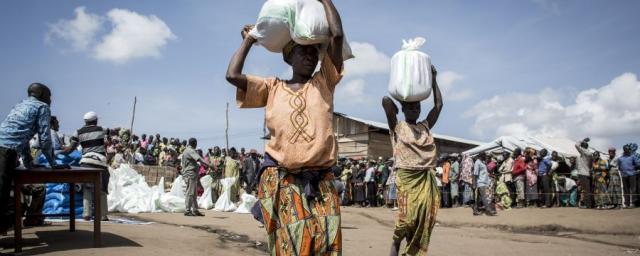
Francoise lost six children in the conflict in DRC. She has been displaced to a camp in Bunia with her five remaining children after their village was attacked. Photo: John Wessels/Oxfam
Urgent action is needed now in the Democratic Republic of Congo. Millions of people have been forced from their homes due to conflict and are in dire need of humanitarian assistance. Oxfam is there supplying emergency food and clean water. With your help we can save more lives.
"We are putting everything we learnt in the Ebola outbreak in West Africa into fighting Ebola here. But Ebola is only one of the numerous and serious humanitarian crises in which people in DR Congo are caught up without any kind of aid."
Millions facing severe hunger
Democratic Republic of Congo has been engulfed in a complex humanitarian crisis for decades. Over the last two years, the situation has massively deteriorated due to an increase in the scale and number of conflicts in the country.
The crisis has led to an eight-fold increase in hunger. Full farming seasons have been missed, leading to severe food shortages. Millions still do not have access to clean water, drinking instead from unprotected water sources.
Over 13 million people are facing acute hunger, and more than 5 million people have fled their homes, making it the largest displacement crisis in Africa.
The resurgence of Ebola
The country is also facing the second most severe Ebola outbreak the world has ever seen, after the West Africa epidemic, which claimed over 11,000 lives.
Since the outbreak was declared in August 2018, the virus has spread from 4 to 19 health zones in two provinces of Eastern DRC (North Kivu and Ituri). It has emerged in places where access is extremely challenging due to the presence of armed rebel groups.
While the number of cases is slowly reducing, the outbreak remains a public health emergency of international concern. Over 3400 people have contracted the virus and 2200 people have died. Meanwhile, hundreds of thousands of people continue to be displaced by violence and many are living in dire conditions in overcrowded camps.
Oxfam is working with communities to prevent the spread of the Ebola virus as well as responding to help those displaced by violence and other on-going crises in the country.
 Oxfam is helping local communities by constructing latrines and digging boreholes to provide clean safe water. Photo: Diana Zeyneb Alhindawi/Oxfam
Oxfam is helping local communities by constructing latrines and digging boreholes to provide clean safe water. Photo: Diana Zeyneb Alhindawi/Oxfam
Emergency food, water and sanitation: Oxfam's response
Oxfam has been working in DRC since 1961. We are providing emergency humanitarian assistance and working to improve their lives in the long term. Our priority is to provide clean water and sanitation facilities to displaced people and host communities.
We are also implementing short-term strategies to enable the most vulnerable households to meet their needs. We’re providing seeds for crops, running ‘cash for work’ programs and distributing cash and vouchers to allow people to buy food and basic necessities.
Our Ebola response is focussed on public health promotion and supporting community-led solutions to help prevent the spread of the deadly disease. We are also providing safe, clean water in affected communities and improving the infrastructures of health centers, installing hand-washing and water chlorination points, as well as showers and latrines. Since the outbreak began, we have reached more than 750,000 people.
With your help we can save more lives today.